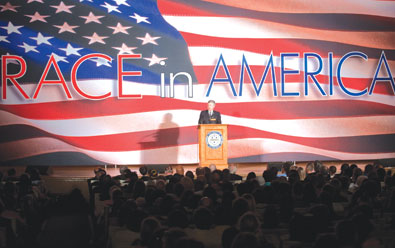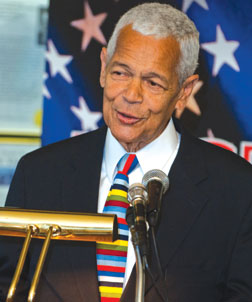Chancellor Welcomes Julian Bond to Race Conference
(This is an abridged print version of Chancellor Mark A. Nordenberg’s introduction of Julian Bond, chair emeritus of the NAACP and the opening keynote speaker for Pitt’s June 3-5, 2010, national conference, “Race in America: Restructuring Inequality.” Bond addressed an audience of about 800 people June 3 in Soldiers and Sailors Military Museum and Memorial. The conference was organized by Larry E. Davis, dean of Pitt’s School of Social Work, and Pitt’s Donald M. Henderson Professor and director of the University’s Center on Race and Social Problems.)
 Mark A. Nordenberg addresses the audience of nearly 800 participants at Soldiers & Sailors Memorial.
Mark A. Nordenberg addresses the audience of nearly 800 participants at Soldiers & Sailors Memorial.Thank you very much, Larry, and good evening, everyone. When Provost Maher and I pried Larry Davis out of his very comfortable endowed chair at Washington University in St. Louis and persuaded him to become the dean of our School of Social Work, we expected big things. And he has been delivering in big ways for the past nine years. Certainly, we see clear evidence of that tonight, as we launch this historic conference, “Race in America: Restructuring Inequality.”
It is my privilege, as Pitt’s chancellor, to welcome each of you, to comment briefly on the program, and to introduce our distinguished guest Mr. Julian Bond - Chairman Emeritus of the NAACP. Mr. Bond’s presence is an exciting taste of things to come—because this conference will bring to our campus some of the nation’s most prominent experts on race. Their insights will add to the richness of the discussions to take place over the course of the next two days …
Julian Bond has long been one of America’s most prominent leaders in the movements for civil rights and economic justice. Some seven years ago, before a packed University of Pittsburgh house, Mr. Bond delivered the inaugural lecture that publicly launched our Center on Race and Social Problems. This evening, to our great good fortune, he has returned to deliver another seminal address, entitled “The Road to Freedom: From Alabama to Obama.” In doing so, he will officially open this gathering of one of the largest groups of authorities on race ever assembled at an academic conference.
Mr. Bond is the perfect individual to deliver tonight’s keynote address because he is a man who has devoted his life to redressing injustice at every turn. From his student days at Morehouse College in Atlanta through his more than a decade-long service as chairman of the country’s oldest and largest civil rights organization—the NAACP—Mr. Bond has inspired us, challenged us, and encouraged us to confront and constructively deal with issues of race.
 Julian Bond
Julian BondI first was privileged to meet Mr. Bond when I was an undergraduate and he came to my college to speak. By that time, he already had been a founding member of the Committee on Appeal for Human Rights, a student civil rights organization that helped win the integration of Atlanta’s movie theaters and lunch counters, and the Student Nonviolent Coordinating Committee, formed in 1960 to coordinate sit-ins and voter education drives throughout the South.
Mr. Bond also had been elected to the Georgia House of Representatives, where members who objected to his opposition to the Vietnam War denied him his seat. Mr. Bond finally was seated after a third election and a unanimous decision of the United State Supreme Court. He served until 1974, when he was elected to the Georgia Senate. He retired from his Senate seat in 1986.
The holder of at least 25 honorary degrees, Mr. Bond now serves as a Distinguished Professor in Residence at American University in Washington, D.C., and as a professor in the Department of History at the University of Virginia. He also serves on numerous boards, including those of the Southern Poverty Law Center, where he previously was named the civil rights organization’s first president, and People for the American Way, whose mission is to make the promise of America real for every American.
A former commentator on America’s Black Forum, the oldest Black-owned program in television syndication, Mr. Bond also is a prolific and award-winning writer, poet, and narrator. His voice has given life to numerous documentaries, including the critically acclaimed series Eyes on the Prize and K. Leroy Irvis: The Lion of Pennsylvania, which was produced by the University of Pittsburgh Office of Public Affairs.
Would you please join me in welcoming back to Pittsburgh and to the podium the venerable civil rights leader Mr. Julian Bond. [Applause.]
Other Stories From This Issue
On the Freedom Road

Follow a group of Pitt students on the Returning to the Roots of Civil Rights bus tour, a nine-day, 2,300-mile journey crisscrossing five states.
Day 1: The Awakening
Day 2: Deep Impressions
Day 3: Music, Montgomery, and More
Day 4: Looking Back, Looking Forward
Day 5: Learning to Remember
Day 6: The Mountaintop
Day 7: Slavery and Beyond
Day 8: Lessons to Bring Home
Day 9: Final Lessons

